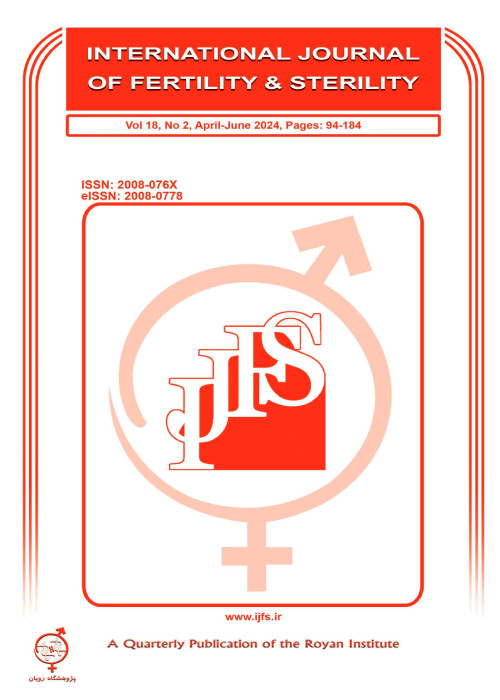Evaluation of Oxidative and Nitrosative Stress Markers Related To Inflammation in The Cumulus Cells and Follicular Fluid of Women Undergoing Intracytoplasmic Sperm Injection: A Prospective Study
Author(s):
Article Type:
Research/Original Article (دارای رتبه معتبر)
Abstract:
Background
Oxidative/nitrosative stress in the oocyte microenvironment could have an impact on intracytoplasmicsperm injection (ICSI) outcomes. The presence of reactive oxygen species (ROS) and reactive nitrogen species (RNS) canstimulate the secretion of pro-inflammatory cytokines, leading to chronic inflammation and potentially affecting embryo aswell as oocyte quality. This study aimed to examine the relationship of lipid peroxidation [measured by the malondialdehyde(MDA) assay] with protein carbonyl [measured by the 2,4 dinitrophenylhydrazine (DNPH) assay] levels in cumulus cells(CCs), as well as nitric oxide (NO), peroxynitrite (ONOO-), and C-reactive protein (CRP) levels in follicular fluid (FF).The potential relationship of these levels with ICSI outcomes was also evaluated.Materials and Methods
In this prospective study, 63 FF samples and their corresponding CCs were collected forICSI procedures. Spectrophotometry was used to assess levels of DNPH, MDA, NO, and ONOO-. CRP levels wereevaluated using an immunoturbidimetric assay.Results
The patients under 37 years with normal ovarian reserve had significantly lower levels of MDA, DNPH,NO, ONOO-, and CRP compared to those over 37 years. Additionally, we observed higher levels of MDA, DNPH,NO, ONOO-, and CRP in the group with an oocyte maturity rate of less than 60%. No significant difference was observedbetween the DNPH levels and factors such as infertility duration, embryo quality, pregnancy, or the number ofretrieved oocytes. A higher level of MDA, NO, ONOO-, and CRP was found to be significantly related to the lowernumber of retrieved oocytes, longer periods of infertility, poor embryo quality, and negative pregnancy outcomes.Conclusion
Oxidative/nitrosative stress, linking to inflammation in the oocyte microenvironment, can be consideredas a potentially useful biomarker for assessing the development and competence of oocytes and embryos and predictingICSI outcomes.Keywords:
Language:
English
Published:
International Journal Of Fertility and Sterility, Volume:18 Issue: 2, Apr-Jun 2024
Pages:
108 to 114
https://magiran.com/p2681907
دانلود و مطالعه متن این مقاله با یکی از روشهای زیر امکان پذیر است:
اشتراک شخصی
با عضویت و پرداخت آنلاین حق اشتراک یکساله به مبلغ 1,390,000ريال میتوانید 70 عنوان مطلب دانلود کنید!
اشتراک سازمانی
به کتابخانه دانشگاه یا محل کار خود پیشنهاد کنید تا اشتراک سازمانی این پایگاه را برای دسترسی نامحدود همه کاربران به متن مطالب تهیه نمایند!
توجه!
- حق عضویت دریافتی صرف حمایت از نشریات عضو و نگهداری، تکمیل و توسعه مگیران میشود.
- پرداخت حق اشتراک و دانلود مقالات اجازه بازنشر آن در سایر رسانههای چاپی و دیجیتال را به کاربر نمیدهد.
In order to view content subscription is required
Personal subscription
Subscribe magiran.com for 70 € euros via PayPal and download 70 articles during a year.
Organization subscription
Please contact us to subscribe your university or library for unlimited access!


